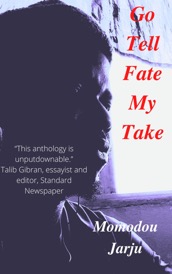
Go Tell Fate My Take by Gambian journalist and poet Momodou Jarju is a book that depicts a transformation of dream and admiration into a declamatory literary work. The poems in the anthology, which is expected to be released on 2nd September 2022, tells how a young man’s dream translucent from kicking the football to pushing the pen; from dreams of becoming a professional footballer to a published writer. Why the change from foot to hand, ball to pen? This is acquired through a mixture of pain, hope, dreams and desires to accomplish something in life.
This anthology has 25 poems written in free verse form in different lengths and stanzas. The poems explore childhood dreams that were dashed by sickness accompanied by pain and hopelessness yet faith and the admiration of great and noble individuals inspire and motivate the poet to dream again.
In the poem “Echoes of Reflection” the poet remembered how he played football as a hobby and the conviction that only the sky was the limit in the pursuit of a career in football. The dream of becoming a professional footballer someday was dashed by foot ailment. “I sank in bed staring up stupidly/ dying to decipher what’s going on.” This was the beginning of the change of his dream. “The impact of my foot to the hand I’m fate”. His foot is no longer palpable to play the ball. He can only watch with jealousy as his mates “Harassing the ball”. Literally, in jealousy he hailed his “pen un-sass.” The poet now became a self-appointed narrator of the society’s “Everyday stories.” A journey into “Pen’s Mission” begins, accepting his fate as a writer.
In the poem “Man Proposes, God Disposes”, the poet gave up when he realised that his dream of playing football is unrealisable. “I gave up and life and lost hope” he again realised that dreams are never scarce as long as we stay true to ourselves. “At twenty-above I learned to be me/ believing again and fate became my only hope.” His resignation to fate is rooted in his belief in God’s plan. This does not disrepute the inspirations he drew from great and hardworking people to realise his dream as he remembers Dr. Lenrie Peters. “You a mentor I motive MOST/ And aim to achieve way MORE.”
However, in the poem “The Guest”, the poet was on a sickbed, preparing and longing for death. The desire for life and dream was at an abyss. “When time comes calling/ I’m urged and prepared/ To welcome the evitable”. This was only because of his “Fear of illness”. But realising that “the guest does not prioritise now” and life is full of dreams, he has a second thought; “but now begging my Maker/ to let me stay and live/ longer like never before” because “dying young/ brings non- identical twin thoughts.”
Looking at the achievements of Lenries Peters as a surgeon and writer; the courage of Deyda Hydara as a journalist; and the selfless sacrifice of Edward Francis Small and Nelson Mandela as leaders, have inspired and energized the poet to dream, hope and work. Therefore, between the sickbed, the shadow of pain and death, the selfless sacrifices and attainments of great individuals witness the birth of a writer, a poet and a journalist.
Go Tell Fate My Take has coherence and transition of themes in chronological order that makes the 25 poems to be read in continuity. The poems should not be read in isolation, if you want to fully grasp the development of the writer and the transformation of his dreams.
The book, however, does not have traditional rhyme patterns but sporadic rhymes of various poems can be seen. There is a use of alliteration, repetitions assonance, metaphor and personification, some similes and rhetorical questions that give the poems some eloquence.
Amadou Manjang is a third year student of the University of The Gambia (UTG) majoring in Political Science and minoring English Language. He is also a journalist and aspiring author.





